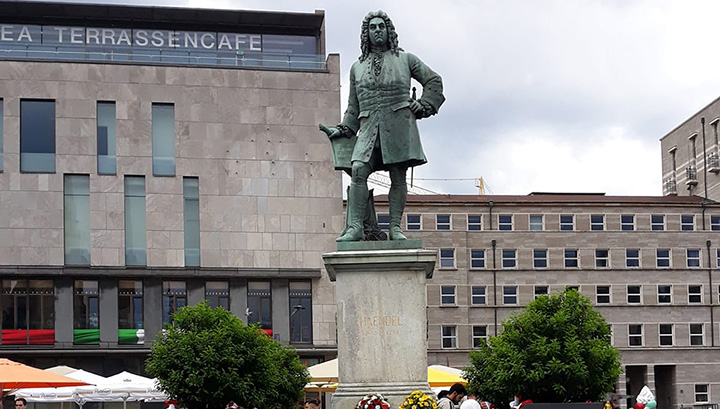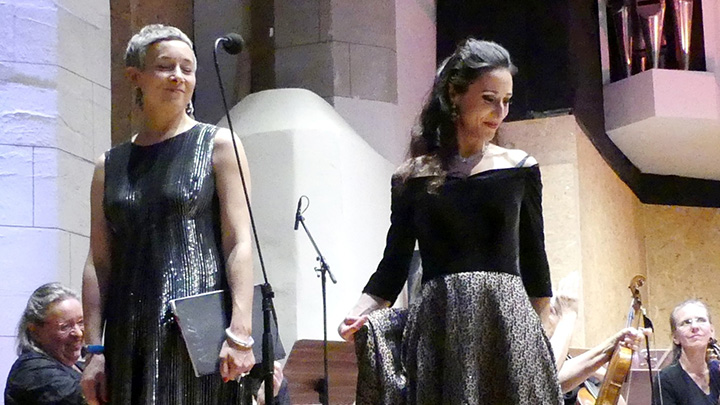Halle if ya hear me

Since my sister and her husband live in Hamburg till the top of June, I pounced on the chance to go to them once more plus attend my first Händel-Festspiele in Halle (Saale), the composer’s birthplace. My unbelievable week there included a number of the most exhilarating and nourishing music-making I’ve heard in a really lengthy whereas.
After I first grew to become fascinated about opera—across the sixth grade or so—I used to be instantly drawn to classical and pre-classical works. Past Mozart, I wasn’t getting them from the Met broadcasts I listened to each Saturday, so I diligently scoured the downtown library’s large LP assortment. Quickly my two favourite recordings grew to become the Julius Rudel Giulio Cesare and Glyndebourne’s Leppardization of Cavalli’s L’Ormindo. My irresistible attraction to “early opera” has stayed with me to this present day.
Quickly after I received my reel-to-reel tape machine and started shopping for pirates and broadcasts, I found the Göttingen Handel Competition which in 1920 started the 20th century Handel revival with its manufacturing of Rodelinda. I relished Göttingen broadcasts of rarities like Sosarme and Riccardo Primo in German, however I didn’t hear about Halle till years later. Although Göttingen has in recent times launched its featured opera on CD, Halle tends to have a extra modest worldwide profile although the scope of its choices far exceeds that of its close by neighbor.
This 12 months’s Halle pageant was fancifully dubbed “Oh La La! Händel? – Französische Inspirationen” and ran from 24 Could till 9 June. Typically the French connection was slight to say the least, however the imaginative programming introduced collectively a number of the world’s most interesting performers. The 64-page pageant booklet listed as many as 9 occasions per day starting from excursions and lectures to occasions for households, along with the numerous musical performances which occurred all through Halle in addition to in neighboring cities like Dangerous Lauchstädt and Bernberg for which cheap bus transportation was accessible.
I may need attended many extra choices than I did, however I ultimately settled on simply three oratorios, two operas and three vocal live shows carried out in six enticing venues scattered round Halle’s generally treacherous cobblestone streets. The Altstadt is charming with a sprawling central sq. the place one finds each a centrally positioned statue of Handel and a really good TK Maxx. I sometimes received misplaced particularly at evening within the twisty streets heading to or from the numerous auditoria.
A selected pleasure was to listen to stay for the primary time so many singers I solely knew from recordings or broadcasts. The candy Canadian soprano Stefanie True with La Sfera Armoniosa carried out two early cantatas in “Händel in Rom.” True carried out and not using a rating which gave each “Clori, mia bella Clori” and “Armida Abbandonata” an thrilling immediacy. The seven-member group was led by Mike Fentross whose forthright theorbo-playing dominated her accompaniment. Preserving with the French theme, a serenely pregnant Sophie Junker repeated her program (accessible on an important CD) dedicated to music written for or sung by one in all Handel’s ultimate muses, French soprano Elisabeth Duparc aka La Francesina. Junker’s ravishing, agile voice, backed by Le Live performance de l’Hostel Dieu, positively glowed in eight opera and oratorio arias capped by a gorgeously spun encore of “Lascia ch’io pianga.” It was simply one of many many instances I left a theater blissed away by what I’d heard.
However essentially the most gratifying solo live performance was “La Tempesta d’Amore,” my first Halle present, after I received to listen to the nice Italian soprano Raffaella Milanesi for the primary time in over 20 years. One of the crucial stimulating live shows I’ve attended featured Milanesi with Christophe Rousset and Les Talens Lyriques in 2003 at Paris’s Citê de la Musique the place they introduced uncommon early classical arias written for castrati.
She was unbelievable then, a time when she starred in a lot of superb baroque opera recordings. Milanesi hasn’t been within the limelight a lot not too long ago, so I feared she was now not singing nicely. She started an aria from Riccardo Primo in cloudy voice, however her uniquely wealthy soprano sounded as if no time had handed in any respect in a cantata by Alessandro Scarlatti. However the highpoint of the afternoon was her transfixing rendition of Handel’s “Qual ti riveggio” for which she tossed apart her rating and solid an distinctive collaboration with G.A.P. Ensemble’s colorfully-named cellist Oriol Aymat Fustê. Their divine B part of the cantata’s second aria made me really feel that I used to be meant to be in Halle! Her encore, a subtly seductive “V’adoro pupille” from Giulio Cesare topped an ideal first Halle afternoon.
However an much more excellent night adopted when Solomon’s Knot introduced on the Dom au Halle its impressed model of Esther, Handel’s first English oratorio. The English collective’s ten vocalists shared the solo roles in addition to the stirring choral numbers. As soon as once more performing with out scores, the singers seamlessly moved out and in of their duties in a easy however efficient semi-staging that achieved a most shifting depth. No conductor led the small, wonderful interval ensemble, however bass singer Jonathan Sells was credited as conductor. Simply as I had marveled that six singers might so successfully deal with a number of Esther choruses at a latest Opera Lafayette live performance, Solomon’s Knot’s ten soloists accompanied by its trendy small period-instrument band (that includes an exceptional oboist) made a triumphantly mighty sound that made the strongest case for an unjustly uncared for oratorio and satisfied me it’s a real Handel masterwork.
A number of days later we heard on the Konzerthalle Ulrichskirche Athalia, one other early oratorio, which like Esther, is customized from a play by Jean Racine. Philipp Ahmann’s large method lacked the dramatic affect of Esther however provided many musical delights, notably from its vocal soloists. Alex Potter, Benjamin Hulett, and Edward Grint got here throughout as skilled Handelians, however it was the 2 women who made the night notably particular.

Anna Dennis because the saintly Josabeth endowed her pretty music with sounds of unearthly magnificence. It was troublesome to consider her arias and duets with Potter had ever been extra gorgeously sung. Because the evil title character, Swiss soprano Marie Lys embraced her villainy with a fierceness that generally threatened to go excessive—however didn’t. She added excessive ornaments to her arias that scaled the higher heights of her voice to its harshly scary depths.
Ahmann’s Leipziger Barockorchester performed adeptly if with out the spirit and chew of Solomon’s Knot’s a lot smaller band. The almost forty voices of the MDR-Rundfunkchor sometimes sounded muffled within the Ulrichskirche’s ungenerous acoustic. Nevertheless, two nights later the at all times magnificent, significantly smaller Choeur de Chambre de Namur in Handel’s ultimate oratorio Jephtha conquered the identical house with fantastically exact and alert singing that dug deep into a number of the most interesting choruses the composer ever wrote.
The recipient after the live performance of the pageant’s annual Hãndel Prize, Rousset, who’s having a unprecedented season, introduced the refrain and his Talens Lyriques to Halle for a nobly shifting Jephtha throughout which Jeremy Ovenden sounded infinitely higher than he had on some latest broadcasts. His biting diction and virile agility introduced an anguished the Aristocracy to the title character who, like Mozart’s Idomeneo, affords to sacrifice the primary individual he meets in alternate for a navy victory. For Jephtha that’s his daughter Iphis whose destiny his spouse Storge foresees in vivid music that mezzo Sophie Harmsen dispatched with modest fervor. Tim Mead’s mellifluously ardent Hamor and Edwin Crossley-Mercer’s sternly authoritative Zebul rounded out a strongly unified forged.
However the sudden pleasure of Jephtha was the last-minute substitution of Lys for the absent Deborah Cachet as Iphis. Eyes glued to her iPad, she introduced an ideally harmless lightness to one in all Handel’s most enchanting heroines. She gracefully accepted her destiny with a freshly floating, silvery soprano of shifting sincerity. Lys’s gorgeous double-play of Athalia and Iphise will stay amongst my happiest Halle recollections.
However what about opera? I couldn’t match on this 12 months’s new manufacturing of Amadigi directed by Louisa Proske on the Halle Oper. However I did catch a revival of final 12 months’s Serse, one other Proske manufacturing. The American director whose work I loved as one of many founders of Heartbeat Opera, selected to mould Serse into an attractive romp ignoring the intense feelings that surge all through the late-career opera. Although Jon Bausor’s stage-filling airplane set offered many delights, Proske’s selections inevitably went towards broad and frenetic hijinks.
The hacked-up musical version was surprising within the midst of a pageant that in any other case demonstrated excessive musicological values. Quite a few arias had sections randomly omitted, and Amastre oddly received an additional aria from one other work. Although the director clearly present in Amastre a heroine equal to Romilda, she sanctioned the omission of the haunting duet between Amastre and Serse, one of many few moments within the opera that connects them. With out it, their reunion through the denouement doesn’t make a lot sense.
A lot of the forged had been members of the Halle Oper and never early music specialists. Nevertheless, Yulia Sokolik as Amastre displayed a strong grasp of the type as finally did Franziska Krötenheerdt, who had began out fairly edgily as Romilda. Andreas Beinhauer’s antic Elviro was grandly sung even when he donned full flight attendant drag.
As Arsamene, Leandro Marziotte’s pale countertenor alternated wan moments with delicate ones. His daring if hyperactive characterization held its personal reverse that of the good Anna Bonitatibus because the temperamental, clueless title character. Alarms went off in my head on the opera’s begin when she carried out a very quiet “Ombra mai fu,” however it quickly grew to become clear that her method was simply an eccentric selection. In any other case, she carried out credibly because the dumpy, unfortunate Serse.
Essentially the most noteworthy facet of the night turned out to be an sudden one: Bonitatibus received badly misplaced within the da capo repeat of her ultimate aria “Crude furie.” On the finish she directed the competent conductor Attilio Cremonesi to start out over which they did. This time round she sang with it with ever extra daring bravura culminating in a stunning, death-defying da capo that gave me chills and gained her a rowdy ovation. For Bonitatibus alone, I used to be glad to have seen Serse.
However the operatic highpoint for me was a live performance efficiency by the Wroclaw Baroque Orchestra and a forged of singers drawn largely from the Parnassus administration company of Teseo, Handel’s lone five-act opera with a textual content tailored from Quinault’s libretto written for Lully’s Thésée. The opera is a favourite of mine, a chunk filled with loopy coloratura showpieces and heartfelt laments. And its Medea is the second of Handel’s marvelous portraits of heartbroken sorceresses that culminate in Alcina. A singer beforehand unknown to me, French mezzo Fanny Lustaud, scorched the partitions of the Freylinghausen-Saal of the Frankesche Stiftungen along with her fiery Medea, although she’d have been much more efficient if her Italian had been crisper.
Suzanne Jerosme suffered sweetly as the unfortunate Agilea however she too tackled scores of sixteenth notes with insouciant assurance. Conductor Jaroslaw Thiel selected extraordinarily brisk tempi all through when some may need labored simply barely extra slowly. His haste was notably noticeable within the deliriously frenzied erotic love duet between Agilea and Teseo.
Very younger male soprano Dennis Orellana as Teseo typically astonished together with his wide selection and quicksilver facility, however I typically wished he would modulate his voice extra subtly. However he was way more achieved than countertenor Franko Klisovic whose hooty, show-offy antics irritated as Arcane. Clizia, his love curiosity, doesn’t get very attention-grabbing arias, however Johanna Rosa Falkinger sang them with an endearing modesty. Reasonably than import one other of the numerous Parnassus countertenors, Thiel introduced superb contralto Sonja Runge who was constantly spectacular; why isn’t she higher identified in a world that at present lacks many achieved baroque altos?
As a result of I had deliberate to listen to her carry out the identical program at Zankel Corridor in April–however it was abruptly canceled with out clarification, I missed Magdalena Kozena singing all of Alcina’s arias with La Cetra. As an alternative, I trekked out of Halle to attend a uncommon staging of Georg Philipp Telemann’s Sieg der Schönheit in Magdeburg, the composer’s hometown. I by no means did work out the lengthy opera’s comedian plot, however the singers had been exceptionally superb, notably Lydia Teuscher and Terry Wey. Within the pit was the Akademie fur Alte Musik, one of many world’s best possible period-instrument ensembles, who reveled in Telemann’s astonishingly bracing orchestral writing below Michael Hofstetter. Whereas Telemann ranks nicely under Handel as an opera composer, it was thrilling to listen to one in all his operas in a theater not so very removed from the positioning of Hamburg’s Gänsemarkt, the numerous, long-ago destroyed opera home the place Handel started his opera profession together with Telemann and Reinhard Kaiser whose Octavia will probably be carried out at each subsequent 12 months’s decreased Halle Händel-Festpiele and the subsequent version of the Boston Early Music Competition.
By the way in which, Hamburg hosts in its KomponistenQuartier a pleasant museum dedicated to a bevy of local-ish composers: Telemann, Carl Philipp Emmanuel Bach, Johann Adolf Hasse, Fanny and Felix Mendelssohn, and Gustav Mahler! Subsequent door, there’s additionally a Johannes Brahms museum, however I skipped that one.
Pictures:
Handel’s Statue in Halle Photograph: Christopher Corwin
Anna Dennis and Marie Lys after Athalia at Händel-Festspiele
Photograph: Françoise Laugier-Morun

